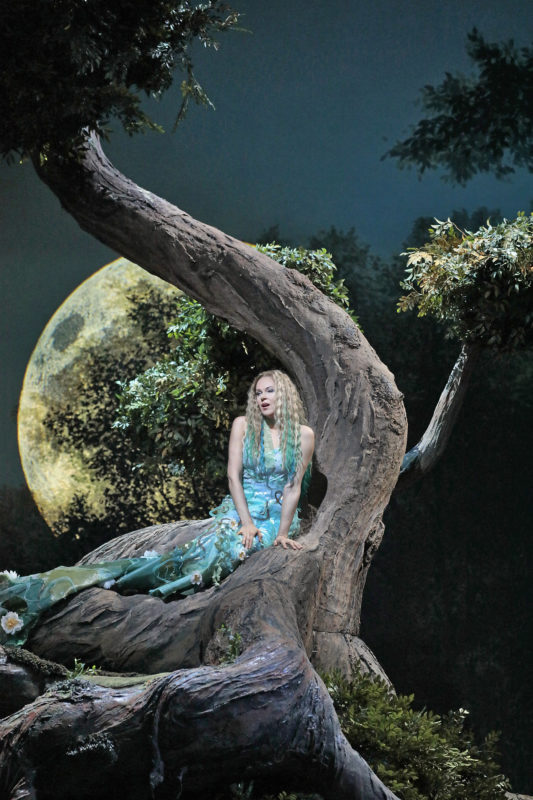| February 3, 2017


| February 3, 2017

“The mysterious look of the production, fantastical and ominous, combines with the sensual singing of a handsome cast to create a romantic energy rare at the Met — or at any opera house … the Met has assembled a matchless cast, led by the lovely soprano Kristine Opolais, who gives a vocally lustrous and achingly vulnerable performance as Rusalka, the water nymph who falls in love with a human prince. Even in the unusual love scenes between the prince and the silent Rusalka, who has given up her voice to become mortal, Ms. Zimmerman has coaxed simmering tension from Ms. Opolais and the dashing tenor Brandon Jovanovich … with her fidgety physical gestures and darting eyes, Ms. Opolais conveys the character’s restlessness and pining. This powerful singing actress adds unusual intensity to her plaintive “Song to the Moon,” Rusalka’s famed lament, suggesting the character’s defiant side more than most sopranos … finally, the two have a real love duet, impassioned, fitful music, sung here with burnished sound and wrenching beauty by Ms. Opolais and Mr. Jovanovich.”
Anthony Tommasini – The New York Times
“Kristine Opolais dives head first into the dark waters of Dvorak’s Rusalka” in Mary Zimmerman’s enchanting new production for the Metropolitan Opera and emerges as the new reigning water nymph with a bravura performance in one of opera’s most haunting roles …
Opolais is a revelation. Her “Song to the Moon” is full of yearning, her voice soaring into the upper register with a swell of emotion. She is a fine actress, especially in the second act (when she doesn’t sing until the final scene) as she reels about the Prince’s palace like a frightened animal just let out of its cage. And her final duet with the Prince is aching with remorse.”
Wilborn Hampton – The Huffington Post
“There seemed to be extra warmth in her tone for Thursday’s premiere, as she crafted a lovely, arching, soaring rendition of the Song to the Moon … Dramatically, though, hers was a convincing portrait … It was moving to watch her come to terms with her decision and the harshness of the world she chose.”
Eric C. Simpson – New York Classical Review
“Ms. Opolais spins gloriously radiant, luminous lines, somehow delivering Act I’s “Měsíčku na nebi hlubokém” (Song to the Moon) both tentatively and self-assuredly. Her desperate Act II plea for help is as ravishing as it is riveting.”
Richard Carter – Blasting News
“Kristine Opolais’ naturally cool persona is well suited to the role of the water nymph. Docile and wan, her Rusalka is vocally steady, measured and clear, though her voice is willing to risk abandon during moments of aching ambition and desperation. She also does well during the second act, where much of her work requires silent pantomime, conveying the character’s growing anxiety and lack of agency.”
Patrick Clement James – Parterre
“Kristine Opolais as Rusalka is translucent moonlight and cold revitalizing river water – always crashing softly into everything. She gives a feisty yet fragile rendition of the woman putting out flames with her cold fire. She felt like a flooding river bursting its banks, unable to contain her sorrow. She was magnificent. The famous “Song to the Moon” aria was delivered so sensationally as she sat high in the branches of a tree with the full moon rising behind her – a perfect moment from all the co-mingling elements. When she “lost” voice in Act II, you ache to hear her again. You miss her vocal presence and her heartfelt, soaring singing.”
Jacquelyn Claire – NYTheatre Guide
“Kristine Opolais conveyed the heroine’s essential innocence with properly subdued rapture and … sang radiantly.”
Martin Bernheimer – Financial Times
Image: Ken Howard / The Metropolitan Opera
November 5, 2025
Roderick Cox, conductor Kristine Opolais, soprano Mika Kares, bass